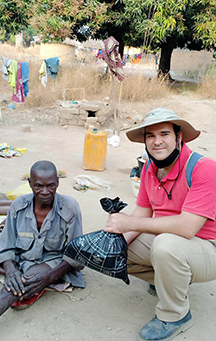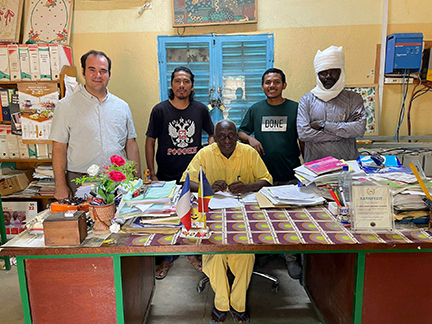Frt. Brian Junkes
Justice & Accompaniment
By Seminarian Brian M. Junkes, SVD
In my first two years of studying theology, I would often read and hear about the need to resist unjust and oppressive systems. This would include systems of poverty, racism, patriarchy, and other oppressive systems. I was ignorant of what resisting these systems had to do with serving in a parish, teaching in a seminary, or doing mission. I soon began to understand how it is crucial for ministry and our mission work as Divine Word Missionaries.
After completing two years of theology, I started my Clinical Pastoral Education (CPE) program. I spent the summer as a chaplain in a hospital from May to August of 2021. I enjoyed visiting patients, having conversations with them, and supporting them while they were getting medical care and recovering. I accompanied people of various age groups, religions, and cultures. One such case, I remember very well was accompanying an African American woman with a chronic illness in need of rest. The first time I met her, she broke down crying. She was extremely anxious about her apartment because she needed to pay the rent to the landlord. This landlord had made numerous threats to kick her out. Rather than focus on her recovery, she was worried about the landlord. Then she told me that her apartment was in disrepair and had cockroaches. Immediately, I made a referral to a social worker in the hospital. I made two follow-up visits after the initial encounter when she talked with the social worker.

She needed to work on getting better and not worry what would happen to her apartment. I believe that everything she told me was connected to racism, from how she was treated by the landlord to the living conditions of her apartment. This experience made me realize how a minister can play an important role when God’s people are experiencing injustice. I was not a savior, but believing her story, I acted by making the referral, and following up with another visit also made a difference. This experience helped to prepare for my Cross-Cultural Training Program (CTP) in Chad.
I arrived in Chad on September 28, 2021, and would stay until June 27, 2023. My experience in Chad changed my worldview and my theology. Witnessing the poverty of the people in the rural areas and political violence of people with no power and little to no hope to change their reality strongly impacted me. At the end of October of 2022, I had to stay and not go outside the community where I was staying because antigovernment protests demanding a change in government were happening. From seven in the morning until around four in the afternoon, I could hear the military shooting at protesters. That day, sixty people died in multiple major cities and hundreds were injured. Regarding political violence, in his book Jesus and the Disinherited, Howard Thurman writes: “When power and the tools of violence are on one side, the fact that there is no available and recognized protection from the violence makes the resulting fear deeply terrifying.” Indeed, it was terrifying, for I was scared of the violence entering the community grounds. The common people did not have the means for self-determination or for meaningful change. This made me wonder, “How can I accompany people as a minister during troubling times?”
Observing the vast difference between the city and the rural areas, those with wealth and power and those without, made me aware of how real exploitation, oppression, and neocolonialism is. As Frantz Fanon wrote in The Wretched of the Earth, “the singularity of the colonial context lies in the fact that economic reality, inequality, and enormous disparities in lifestyles never manage to mask the human reality.” The reality I grew up in as a member of a white American middle class family was vastly different because I did not have to worry about not having three meals, access to water, or sudden changes in the political situation. It made me take a deep hard look at myself. I had to ask myself hard questions about solidarity with the poor and oppressed, justice, being present to an oppressed community, my faith, and a church that is truly for the poor. I struggled and thought deeply about these kinds of topics—and I still do now.

When I was in the last few weeks of my CTP experience, I gave a reflection to the community I was serving. This reflection was based on a recent attack on the town by bandits or a rebel group that happened a few weeks prior. This situation made me feel overwhelmed and afraid because the people who were fleeing fled to the rectory for safety. In the midst of chaos, I found comfort. This comfort was found in the people coming together and some of the community members ready to protect the women and children. I knew everything was going to be ok. I commended the community that they were ready to help the refugees that came from the nearby towns and villages that were also attacked.
It is in the everyday experiences that God is present. We as future ministers should not ignore how our words and accompaniment can be life-giving and supportive to those who are disempowered and scared.
We'd Love to Hear From You
His mission is Our mission...Is it Yours? Let’s find out together!